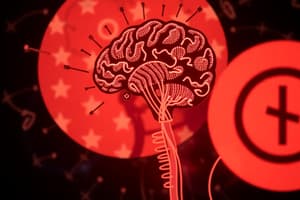Podcast
Questions and Answers
What is Social Science?
What is Social Science?
The study of human behavior and relationships with others in terms of emotions, psychology, and the impact of belief on the environment based on scientific research.
Economics is classified as a natural science.
Economics is classified as a natural science.
False (B)
Opportunity cost is what we give up when we choose one thing over ______.
Opportunity cost is what we give up when we choose one thing over ______.
another
What does scarcity mean?
What does scarcity mean?
Which of the following is NOT one of the four productive resources?
Which of the following is NOT one of the four productive resources?
What is microeconomics?
What is microeconomics?
What does macroeconomics focus on?
What does macroeconomics focus on?
Match the following terms with their definitions:
Match the following terms with their definitions:
Opportunity cost only applies to individual decisions.
Opportunity cost only applies to individual decisions.
What are sunk costs?
What are sunk costs?
Flashcards are hidden until you start studying
Study Notes
Overview of Social Science and Economics
- Social Science studies human behavior and relationships, focusing on emotions and psychology, along with environmental impacts based on scientific research.
- Economics is a branch of social science that examines human activities in resource-scarce environments, using scientific methods and empirical evidence.
Applied Science
- Applied Science applies existing scientific knowledge to practical applications, including technology and inventions.
- Medical sciences, exemplified by medical microbiology, represent key areas within applied sciences.
Key Economic Concepts
- Opportunity Cost: The value of the next best alternative that is forfeited when a choice is made.
- Scarcity: A fundamental economic issue where resources are insufficient to satisfy all human wants, necessitating choices on resource use.
- Resources fall into four categories: labor, capital, natural resources, and entrepreneurial ability, with scarcity defined as the inability of supply to meet demand.
Factors of Production
- Four productive resources (or factors of production) are:
- Land
- Economic Capital
- Labor
- Entrepreneurship
Microeconomics vs. Macroeconomics
- Microeconomics: Focuses on the actions of individual agents in the economy, including households, workers, and businesses; addresses consumer behavior and firm theory.
- Macroeconomics: Examines large-scale economic phenomena like growth, unemployment, inflation, and trade balance; derived from the Greek "makros," meaning 'large'.
Economic Models
- Economic models provide simplified versions of reality to understand and predict economic behavior.
- They can be expressed through both verbal descriptions and mathematical representations, utilizing algebra and graphs.
Circular Flow Diagram
- Illustrates the economy's flow between households and firms in both goods-and-services and labor markets.
- Goods-and-Services Market: Where firms sell and households buy.
- Labor Market: Where households sell labor to firms or other employers.
Budget Constraint and Sunk Costs
- Budget Constraint: Represents all combinations of goods affordable based on income and prices.
- Sunk Costs: Past costs that cannot be recovered and should not influence current decisions.
Decision Making
- Recognizing opportunity costs can influence individual behavior and choices significantly.
- Societal decisions also involve opportunity costs; for instance, universal healthcare may necessitate trade-offs in areas like housing or environmental policy.
Studying That Suits You
Use AI to generate personalized quizzes and flashcards to suit your learning preferences.



